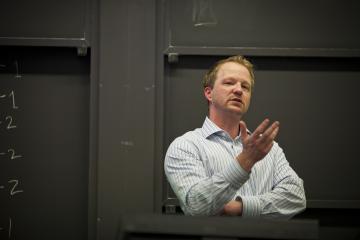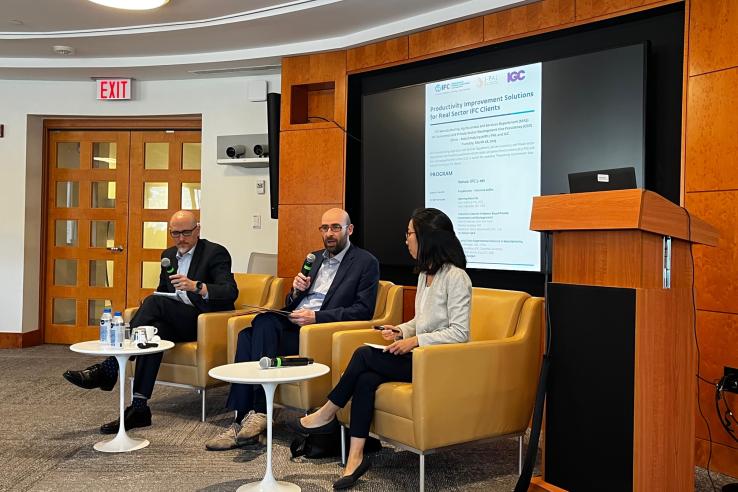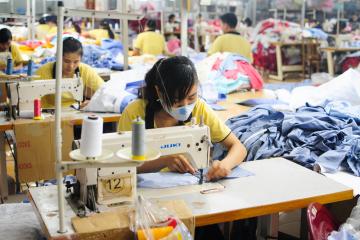
J-PAL partners with the IFC and IGC to discuss global supply chains, sustainability, and research collaboration

Photo: Michael Hou
Private-sector firms in low- and middle-income countries (LMICs) continue to face low levels of productivity. The question of what drives enterprise growth in LMICs has long confounded managers and investors alike. Policymakers and business leaders can benefit from rigorous evidence on effective ways to support private sector development. Using insights from rigorous research in business-related decision-making can allow more firms to meet both financial goals and social goals, like greater sustainability, employment, and worker welfare.
Meanwhile, a growing body of research by J-PAL affiliated researchers using randomized evaluations suggests that supply chains can play a critical role in global poverty reduction. Large firms connected to export markets in sectors such as manufacturing and agriculture can affect a variety of outcomes related to poverty alleviation, from productivity to job quality to technology adoption.
Can more firms learn from randomized evaluations to improve business operations in developing economies? How can development institutions better support clients to achieve sustainable growth and key performance improvements in terms of productivity, gender, work-related practices, skills, and other relevant issues? To explore these questions, J-PAL recently partnered with the International Finance Corporation (IFC) and the International Growth Centre (IGC) to host a workshop titled “Productivity Improvement Solutions for Real Sector IFC Clients'' in Washington, DC. The workshop, the first of its kind, facilitated evidence-sharing and research brainstorming sessions between academic researchers, social enterprise leaders, and staff from the IFC and World Bank Group with a focus on manufacturing, agriculture, and services sectors. The discussions shed light on the rising concern and need for rigorous impact assessments of firms’ sustainability performance, among other issues.
The value of rigorous evidence and data for private sector development
The first half of the event saw two panels where leading organizations and affiliated researchers shared their thoughts on the value of research as it applies to decision-making in investment and operational situations. Pablo Fajnzylber, Director of Development Impact Measurement at the IFC, opened the day by outlining the workshop’s objective of fostering collaborations with researchers to help achieve the IFC’s ambitious goal of strengthening impact evaluations. David Atkin, Firms sector co-chair at J-PAL and Research Program Director for the Firms program at the IGC, provided opening remarks highlighting the successes of evidence use in government contexts and made a call to action for private sector actors to engage with rigorous evaluations.
J-PAL and IGC affiliated professor Rocco Machiavello moderated the first panel focused on the use of evidence in agriculture supply chain contexts. Tomoko Harigaya, Chief Economist and Director of Research at Precision Development (PxD) and Colin Christensen, Global Policy Director at One Acre Fund, shared firsthand experiences on the use of data and scientific research in driving operational improvements and organizational learning. PxD and One Acre Fund are development organizations serving millions of smallholder farmers in Africa and South Asia. Tomoko described how rigorous evaluation methods improved PxD’s programs, including the use of evidence from existing evaluations to help identify effective service types, the use of A/B testing to improve design features of digital extension services, and the use of rigorous evaluations to assess the impact of its services. Colin spoke on the importance of a culture of evidence use, and the need to balance an organization’s priorities with the focus of research. In addition, both Tomoko and Colin agreed that research collaborations can bring in innovative products to contexts where resources for testing new ideas may be limited.
In the next panel, Eric Verhoogen, a Research Program Director for the IGC Firms program and a J-PAL affiliate, and Laura Boudreau, also a J-PAL affiliate, provided insights from randomized evaluations of interventions in the global manufacturing sector. Many of these studies found key social and economic mechanisms which enabled the firms that hosted the research to achieve higher productivity and greater worker welfare. In a garment manufacturer in India, for example, a soft skills worker training program led to an increased likelihood for worker promotions as well as productivity gains that resulted in returns of 256 percent to the firm. In an auto manufacturer in China, allowing workers to participate in their managers’ evaluation led to better manager behavior, gains in team productivity, and a reduction in employee turnover.
Sometimes, these interventions can yield unexpected results. In a soccer ball manufacturing cluster in Pakistan, for example, the introduction of a more efficient production technology was met with low take-up by firms as workers initially resisted adoption. Through qualitative surveys, the research team discovered that the gains from the technology came from reduced waste materials, which led to increased profits for firm owners. However, because workers were paid per piece of work they completed and learning the new technology slowed them down at first, their income fell. Finally, when workers were paid a bonus for learning how to use the technology, incentives between firm owners and workers aligned and more firms adopted the technology. Such scenarios illustrate the value that researchers can provide by deciphering complicated barriers to productivity.
The second part of the workshop centered on a research brainstorming session. “Today, technology and data are everywhere. Now, let’s use this to see not only what we are doing, but how we can do it better,” noted Wagner de Almeida, Director of the IFC Manufacturing, Agribusiness, and Services Department. In this session, IFC investment team managers, leads, and specialists met with J-PAL and IGC affiliated researchers to share experiences and discuss the needs of IFC projects in terms of key issues for businesses in the manufacturing, agribusiness, and services industries.
One of the most frequently discussed themes was the pressing need for investments aimed at decarbonization and other climate goals, around which affiliated researchers and IFC teams discussed how the impacts of sustainability-focused projects could be evaluated. Other points of discussion included the value and challenges of conducting randomized evaluations, how researchers could work with the IFC’s organizational structure, and the need to continue building the case to large organizations in the private sector on the value of scientific research.
Supporting development finance institutions to generate new evidence
This workshop was intended as the first in a series of matchmaking events between researchers and practitioners in private sector development topics. Going forward, J-PAL, IGC, and IFC will continue to engage affiliated researchers in evidence sharing, and identify the scope for innovative and policy-relevant evidence generation in the context of the IFC’s operations across diverse regions and industries.
We encourage partners who are interested in research matchmaking to contact us at [email protected]. Read more about exciting developments from past and ongoing research on our website.



